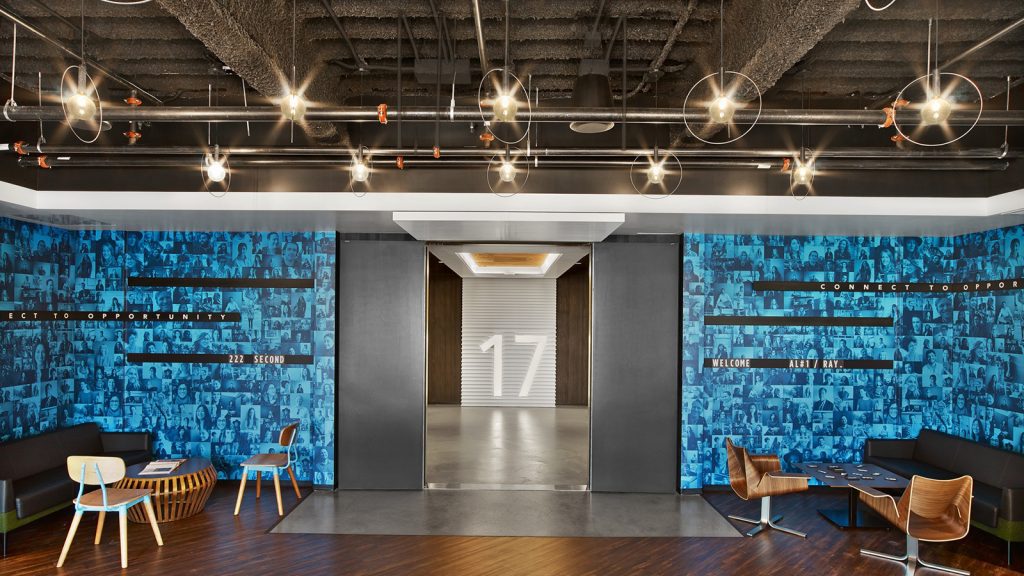Stanford GSB Employment Report Reveals Record Salaries & Employers

For the fourth year in a row, Stanford GSB MBA graduates earned record high salaries with the mean base salary reaching $145,559. According to the 2018 Employment Report, this broke last year’s record compensation. On top of that, this year Stanford GSB grads also received jobs from a record 421 organizations for both summer internships and full-time positions. This demonstrated the broad appeal and diversity of Stanford MBAs.
Tech and Private Equity Interest Jump
Other highlights from this year’s employment report included an increase in interest in the technology industry. In fact, in 2018 it was the most popular industry, garnering 33 percent of alumni—an 8 percent jump from last year. Other top industries included finance, which garnered 31 percent of graduates with private equity being the most sought after area with 13 percent of graduates.
Since three years ago, the percentage of women going into private equity and venture capital has doubled. As for tech, this year a record 40 percent of women chose to work in the tech industry. This shift has many explanations, not the least of which is the coursework taught at Stanford. For Ashley Brasier (MBA ’18), all it took was the class “Entrepreneurship & Venture Capital from the Perspective of Women” to change her course from consumer tech to VC.
“This class showed me that there are several different paths into VC, and empowered me to pursue VC opportunities,” Brasier says.
This year, the number of non-U.S. work-authorized students who accepted jobs in the U.S. stayed flat at 74 percent. More likely than not, this is a result of global trends that are causing extra challenges for students seeking to move locations. This was also reflected in the $12,000 median salary gap between U.S. work-authorized and non-U.S. work-authorized graduates. However, “when controlled for industry and job location, for example in emerging markets, the salary gap diminishes and in some cases disappears,” says Yossi Feinberg, the Senior Associate Dean for Academic Affairs.
Higher Salaries and Steady Job Offers
This year, MBA graduates received the highest salaries ever. The median and average base compensation ranged from $142,000 to $145,559 respectively—$2,000 and $1,000 over last year’s record. Signing bonuses also increased this year by $1,600 to a record $31,146, with an unchanged median at $25,000.
Salaries also increased when it came to cash performance bonuses. This year, 72 percent of the class said they expected a bonus over last year’s 66 percent with average expected bonuses of $64,527. As for stock compensation, 39 percent of the class—nearly two out of every five students—reported stock compensation of some kind.

“This year, 72 percent of the class said they expected a bonus over last year’s 66 percent with average expected bonuses of $64,527.”
And when it came to job offers, numbers remained unchanged. For the Class of 2018, 88 percent of the class accepted offers 90 days after graduates with 95 percent receiving offers. As for where students received these offers, a record 421 organizations hired Stanford graduates this year.
“Our leading employers span a wide variety of industries—consulting, finance, technology, consumer products, healthcare, and nonprofits—but what they have in common are work environments that offer the ability to make an impact, optimize on career development, and provide diverse challenges and responsibilities,” says Carly Janson, the Action Assistant Dean and Director of the Career Management Center.
“In turn, our graduates chose opportunities they felt passionate about, and opportunities to make the world a better place.”
This article has been edited and republished with permissions from its original source, Clear Admit.
Why More and More MBAs are Coming to LinkedIn: #LinkedInLife

Since its 2003 launch, LinkedIn has been shaping the way people find jobs, becoming the most extensive professional social network on the planet. With over 530 million users, it is clear how the platform could pair job seekers with a multitude of career prospects. LinkedIn was just voted Company of the Year by HRDive for the comprehensive recruitment resources it offers its users. However, a network this expansive presents its own pool of opportunities. In fact, Glassdoor dubbed LinkedIn one of the 25 best places to work in 2017. For a company that prides itself on such a unique work environment, its employees even have their own hashtag (#linkedinlife). The company’s rising importance as a recruiting tool in the global economy (hence, over 30 offices worldwide) and its award-winning work environment make a career at LinkedIn an excellent option for MBA grads.
#LinkedInlife
LinkedIn takes a values-centered approach to building its employee culture. According to the company’s website, the values that define LinkedIn are: integrity, humor, transformation, collaboration, and results. Employees are entitled to a multitude of benefits, including 401(k) and Roth contributions, paid parental leave, 17 paid holidays, and an employee stock purchase plan (ESPP). The company also demonstrates its commitment to inclusive strategies by providing back-up childcare resources for employees whose children have special needs.
The Human Rights Campaign designated LinkedIn as one of the best places to work for LGBT equality in 2017. LinkedIn makes an effort to provide resources for its community’s LGBT members, including (but far from limited to) supporting gender reassignment surgery and ensuring that domestic partners and same sex spouses are included in U.S. Benefit programs.
In addition to a unique and inclusive set of standards and values, LinkedIn provides an environment that is far more exciting than that of the standard corporate job. According to The Undercover Recruiter, each floor of LinkedIn’s London office is structured according to a theme. The sports-themed floor has a Wimbledon Room with astroturf on the walls and an umpire chair.

Inside LinkedIn’s San Francisco headquarters/Photo by Eric Laignel.
Getting Hired
In recent years, LinkedIn has trended toward using its website and platform, as well as hosting regional events for recruiting as opposed to using traditional job fair settings. MBAs at LinkedIn can find jobs in sales, marketing, finance, product, and business development through the Student Careers program. At LinkedIn, the community is organized into teams, and each team has its area of focus. Professionals seeking careers specifically in business can choose from about fifteen possible teams. The Corporate Development and Strategy team, for example, leads the way in determining company strategy and analyzing market activity and opportunities. The Global Solutions team focuses on marketing, hiring, and sales. Those who wish to focus exclusively on marketing can look into the LinkedIn Marketing Solutions (LMS) team.
In a 2015 interview with Cosmopolitan, LinkedIn Global Talent Acquisitions Leader Tey Scott discussed how, despite its headquarters being located in Mountainview, CA, the company hires talent from everywhere—which can mean a lot for both domestic and international MBAs.
“We hire from around the world, and we have an amazing relocation assistance program that supports all levels of hires,” she says. “We offer temporary housing, and help employees find daycare, schools, or other things that suit their needs—whether it’s a student relocating from [the East Coast] to Silicon Valley, or someone who has to relocate an entire family and sell a house.”
Scott continues, saying, “We also try to help people get to know the new area they’re moving to. For recent graduates and students, we’ll put them in a LinkedIn group and start conversations with them so they can figure out what neighborhoods they want to live in, and even help them find roommates.”
The company has also made an active effort to convert interns into full-time employees, she adds. “The goal is to convert as many people who come through it into full-time employees. We have interns in all of our locations globally, and we even host interns from other Bay Area tech companies for an annual intern hack day at our headquarters. Undergraduate and MBA interns must be enrolled full-time in a program and return to the program following the internship.”
Find out more about LinkedIn’s MBA internship opportunities here.
Why Bloomberg Businessweek Is Praising the UGA Terry College of Business

At the top of last month’s annual Bloomberg Businesweek domestic MBA rankings, the normative favorites reigned supreme, with the likes of the Harvard Business School, the Wharton School at the University of Pennsylvania, and the MIT Sloan School of Management sitting at the top of the ranking. A quick glance at the top 20 features more of the same, with Ivy League institutions coming in strong, as well as other large school powerhouses like the UCLA Anderson School of Management.
But the real meat and potatoes of the list, beyond stacking trophy cases for the already trophy-rich schools at the top, are the schools that shoot up the rankings the most, sometimes jumping eight or more spots from the previous year. Among the most lauded institutions that made its way up the rankings is the University of Georgia Terry College of Business, climbing from 65th overall in 2016 to 55th overall this year.
Santanu Chatterjee—the full-time MBA Director and Associate Professor of Economics at the Terry College of Business—recently spoke with MetroMBA, saying that part of the reason the school has earned such high praise is because of the concentrated effort of life after graduation.
The school has “a purposeful and deliberate strategy that connects admissions, student experience, and career management, by focusing on employability at the front end, a high level of customized career services for both students and employers, and a market-driven curriculum that ensures professional success for our students,” according to Chatterjee, who originally joined the Terry College of Business in 2001, just after earning his Ph.D. in economics from the University of Washington.

Santanu Chatterjee, Terry College of Business Director, Full-Time MBA Program and Associate Professor.
Although the Terry College of Business is part of the University of Georgia, one of the largest state schools in the U.S., its reputation still lags a bit behind some of the other big name brand institutions. As evident in its climb in the Bloomberg Businessweek ranking, however, its reputation as one of the better, under-the-radar business schools may be soon changing as the result of a plan that has been years in the making.
“Over the past three years, we have focused on making our curriculum more sensitive to the needs of the marketplace,” he says. “Initiatives have included new concentrations in Healthcare Management and Human Resource Management, areas of emphasis in Consulting and Financial Technology (FinTech), and an expanded focus on experiential/project-based learning. Most of our students complete one project with a corporate partner before their summer internships. We have also revamped our Leadership Fellows Program, and set up two new advisory boards, in Atlanta and in the Silicon Valley.”
Part of the wave of program changes over the past few years also comes from newfound partnerships with many of the University of Georgia’s other esteemed colleges, establishing newfound dual degree programs to help facilitate an academic edge many of the country’s smaller schools simply cannot provide.
“While we continue to work on making the MBA curriculum more market-driven, we are also focused on a more interdisciplinary approach to business education,” he says. “Over the past three years, we have worked to develop new dual degree programs with the College of Engineering, Law School, Medical School, and the College of Public Health. New dual programs are currently being developed that include the College of Pharmacy and a one-year STEM MBA for UGA undergraduates in the STEM disciplines. A new one-year Master of Science program in Business Analytics is also awaiting final approval from the University System. These new programs will enable us to significantly expand our corporate relationships and partners, which in turn will help support our curriculum and student support initiatives.”
The use of broader university resources speaks to what Chatterjee believes is becoming a definitive advantage to not only Terry College of Business students, but University of Georgia students as a whole.
“Across the board, the Terry College of Business is focused on student success by providing them with an outstanding academic and experiential learning experience,” he notes. “This philosophy cuts across programs at all levels, from undergraduate to the Masters and Ph.D. [programs]. We have a roster of world-class faculty, excellent facilities, and a dedicated network of more than 70,000 alumni who work tirelessly to improve the quality of education and career success for our students.”
Even with the noted praise Chatterjee eschews for the business school, one program strength he may be overlooking is the welcomed affordability of the Terry full-time MBA, which only costs Georgia-based residents $15,670 per year, compared to several of the more popular MBA programs in the U.S., which often venture into triple digit territory by the end of the program.
For more information on the Terry College of Business and its increasingly praised MBA program, head over to the official Terry College of Business website.
Our Favorite MBA Recruiters: Facebook

These days, it seems like everyone and their mother is on Facebook—no, really, your mom sent me a friend request last week. Your family vacation looked like a blast! As more and more people subscribe to the undisputed king of social media, Facebook seems to hire more and more MBAs to continue to move the company forward into the future. Continue reading…
How Rutgers Encourages Startups to Combat Sexual Misconduct

As Silicon Valley startups continue their apocryphal rise, an avalanche of sexual misconduct allegations has emerged. Rutgers Business School recently discussed the issue, arguing that high-ranking figures in the industry should sign a “No Go, Bro” clause, putting pressure on investors and board members to actively combat any and all misconduct.
As more and more victims of sexual misconduct publicly speak out against their perpetrators, and the Cosby’s, O’Reilly’s, Ailes’, Weinstein’s, and Trump’s of the world are forced to shed the cloak of darkness, the pressure is on for other industries outside entertainment and politics to address toxic work environments that silently condone harassment.
This is especially true in Silicon Valley, where recent high-profile sexual misconduct cases like Social Finance CEO Mike Cagney, UploadVR’s Taylor Freeman, and the recent suit VC firm Benchmark filed against Uber’s Travis Kalanick suggest an end to investor passivity.
The article outlines specific ways that investors can use its decision-making process to affect change from the top. For starters, boards need to establish clear guidelines regarding workplace culture, behavior, and ethics. When abuses of power are built into the very fabric of a company, it becomes easy to normalize misconduct.
Investors need to incorporate contractual language to prevent touchy-feely CEOs from walking away unscathed from a situation in which they misbehave.
“Before making a big investment in a startup, investors should use their power to require CEOs to sign a clause under which they forfeit a large proportion, or potentially all, of their stock, if fired for misconduct, including reasons such as sexual harassment and misrepresentations to investors.”
Ultimately, consumers need to send a clear message to the investors and boards of the companies we patronize that they have to “have to get beyond old-boy and young-bro Silicon Valley psychology [and] exercise their leverage to deter value-destroying misconduct.”
You can check out the entire Rutgers Business School article here.
Full-Time MBA Battle: San Francisco vs. Seattle

Whether it’s 49ers vs the Seahawks or Apple vs Microsoft, it may seem like there are a lot of differences between San Francisco and Seattle. Putting these minor dissimilarities aside, however, and you’ll find common ground between two of the northwest’s biggest cities: Both metros are known as top locations for prospective MBAs looking to earn an advanced business degree full-time. Continue reading…
